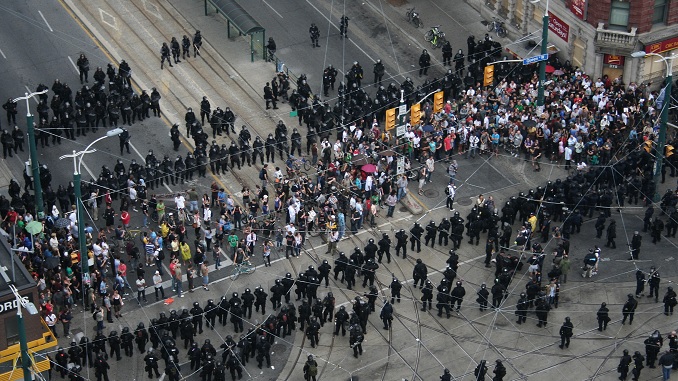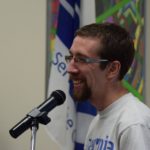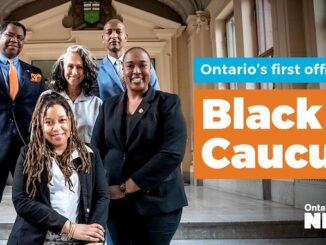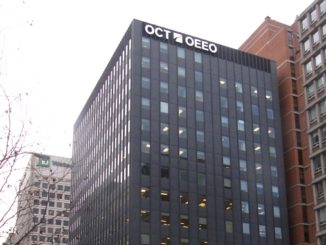Seven years ago, the G20 descended on Toronto. Protests erupted, violence flared, and when the smoke cleared, thousands had suffered arrest, brutality, and trauma at the hands of the people tasked with protecting them. To this day, only a single officer has even been charged – and his case remains under appeal. As we pass the seventh anniversary with no resolution and no justice, we’re taking a look back at what happened that fateful weekend. Today’s story is the first in a three part series. The author, who wishes to remain anonymous, shares their experiences being arrested and dragged through an impromptu political prison at the age of just seventeen years old. Please note that this article contains vivid scenes of brutality.

When I saw the news from Portland last month about anti-fascist protestors being kettled and having flash-bangs and pepper spray hurled at them by the police I got a familiar, heavy feeling in my chest. I felt it again when I saw disabled protestors being zip-tied and arrested for peacefully demonstrating against the Republican health care bill and when peaceful protesters were arrested this weekend on Parliament Hill. It’s the same feeling I get when I think about the G7 summit being held in Canada next year and the consequences of bill C-51.
It’s the same feeling I had when I was packed with no due process into a metal cage in a freezing cold warehouse with my hands zip-tied when I was 17 years old, and I still feel it every time I hear a siren or see a police officer approaching me. So if you are tired of hearing about Toronto’s 2010 G20 catastrophe, I want you to know that I am more tired of thinking about it. Unfortunately, we cannot and we must not forget about what our police and government were willing to do that weekend seven years ago; they have since enacted a law so that they can do it all again whenever they like and face even fewer consequences.
I protested at the 2010 G20 summit because the preliminary health plans that had been released included the global gag rule – an assault on a woman’s right to safe and informed care. On the sunday of the Toronto G20, after having seen the police brutality the previous day, I went to Parkdale, where a press conference about this police violence was being held. The press had moved from their original location by the library to a quiet side street where the police were arresting other innocent civilians and I was drawing peace signs with sidewalk chalk on the sidewalk nearby. My friend was next to me, blowing bubbles. There had been no violence, no aggression, not one hint of riot behaviour, when a horde of bike cops closed in like a pack of hungry piranhas, swarming across the street so no one could leave. Officers grabbed me by the backpack and dragged me to the wall to cuff me, and then after a search of my belongings told me that the saline solution they had found in my bag (yes, the kind of saline solution used to clean eyes and contact lenses) was a dangerous weapon and that I was under arrest for possessing it. About a half-dozen of us were scooped up in this kettle. A ride in the paddywagon across the city to Eastern Avenue later was when I learned how far the police are willing to go.
The first thing I heard when we entered the warehouse was people chanting: “We need food!”, “We need water!”, and “Courage, Courage!” from the Montreal contingent of activists. I knew from eyewitness reports that there had been mass arrests, but I was not prepared for the scale of the cages.
More than a thousand innocent people occupied them over the course of the weekend. The 50 000 square ft warehouse was packed with boxes made of the same square metal fencing used for festival fences, in a sprawling silver maze not unlike a massive kennel. Each cage had a porta potty with no door, and there were cameras positioned to see each one. My handcuffs were swapped out for a zip-tie, and I was put in a cage with about eight others. One woman in my cage had received no medical attention for the rubber bullet wounds on her abdomen and arm. Another was diabetic; she was lying on the floor, near faint and crying because they had taken away her insulin. I can’t tell you how many hours I was in that cage, but eventually I realized that I was the only minor there. The officer whose attention I managed to get by yelling down the “hallway” looked stricken when I told him how old I was and came to bring me to be processed shortly afterwards – none of us had yet been granted phone calls or any due process. An officer in a small trailer near the front of the facility told me I was to be charged with Possession of a Dangerous Weapon (the eye-wash). I told him that I was a minor and asked if by law my parents had to be informed that I’d been detained. He told me to “Think about them before the next time you go protesting”. (Note – my mother came with me to protest against the police five days later.)
Next I was brought to what could roughly be described as a changing stall, where I was searched again and my bra was taken from me because it too “could be used as a dangerous weapon”. At this point I was left in only a thin tank top, since my arresting officer had relieved me of my sweater back in Parkdale. I was brought to a row of much smaller cages against a wall, which resembled a dog pound even more than the others: this was apparently the minors’ section. The cages were perhaps five feet by five feet, and lacked the portapotty and camera features of the adult cages. There was one girl there when I arrived who was also 17, who had never heard of the G20 or cared about politics in her life. She had been on her way home from work when they snatched her off the street. We were soon joined by two more 17 year old girls from Montreal, who had been staying with their student group in a UfT dorm for the weekend. They were raided during the night, whereupon male officers strip-searched and violently arrested all of the occupants, adult and child, female and male alike. One of the girls had been assaulted by the male officer that had strip-searched her.
In the cage next to ours was a 15 year old girl, by herself. She had never read a news report, never been in trouble with the law, and hadn’t been downtown all weekend. Fooling around in a park on a Sunday evening was her crime, and she was terrified. On the other side of us were two boys, a gay couple aged 15 and 16. Neither of them had known what the G20 was either. I tried to talk to them as well, but an officer strolling by noticed them holding hands. I do not think I will ever forget their cries as they were violently separated and one was led away. These were innocent children.
What struck me the most during the hours I spent in those cages was the apparent joy of the police officers. They did not look burdened with their duty to assault minors, break the law, and traumatize peaceful civilians. They were not bothered by the cries or the kids begging for water and food. Some of them laughed as they walked by the 15-year-old crying in the cage next to mine. I can still hear her sobbing, and I can still hear them laughing, in an endless echo. The girls from Montreal were so scared that the police had killed their friends they were screaming their names over the tops of the cages relentlessly, begging for a signal that the people they love had not been beaten to death. The police were unfazed. People who had been kettled at Queen and Spadina, drenched from the rain they’d been held in, had seen the cops take a disabled man’s prosthetic leg and tell him to hop to the paddywagon; those arrested at Queen’s Park had seen police horses trampling family protests and officers using their bicycles as weapons against peaceful civilians. They had all removed their badges and name tags; this is why none of the particularly violent police could be charged for their crimes. We didn’t know who our attackers were. Most of us had heard the resounding thunder of the police banging their clubs against riot shields as they charged towards a peaceful demonstration. We had all seen the brutality the police officers sworn to protect us were willing to dole out to whoever was in the catchment zone of Toronto.
“Stay strong”, said the people in the cages as we were led down halls. “Courage”, called the Quebecois protesters’ voices when the crying from our row got too loud.
Once in the roughly sixteen hours I was caged, officers brought tiny styrofoam cups half-full of warm water for each prisoner, and once they dropped off a small pile of white bread with margarine and a kraft single on each. For vegans and celiacs, there was no food. The facility, being so large and having no permanent fixtures was very cold and in some places, the roof was not entirely sealed. The rain poured for hours, leaking down into many of the cages. The cold and lack of food/water got to me after a few hours and I became sick, whereupon I was taken to an empty cage to keep throwing up. Some hours into my isolation I was lead to a small room with a lawyer who told me he would have me out of there in no time; a few hours in a “release” section of the facility later (read: more cages but behind a wall this time), I was let out with no charge, no record, and no paperwork, only my bra in an evidence bag.
Three days after this experience, I watched my friends, family, and the media celebrate Canada Day. I curled up in a corner, shaking and jumping every time I heard fireworks. Seven years later, it’s the same heavy feeling again when I hear someone talk about how free and caring a country Canada is. This country, this government, did this to me. This government made plans to do it again and wrote these authoritarian powers into law.
The things that I saw the police do, the things I couldn’t understand as a young kid who just wanted to protect a woman’s right to choose, have shaped how I see politics and society in my adult life. When the Liberals and Conservatives passed Bill C-51 I was heartbroken, and that heartbreak was only renewed with the recent C-59, which changes language in the law without changing much of the problematic substance. The same things the police did then – the search, seizure, and arrest without warrant; being held with no due process, explanation, or lawyer – all of it is within their routine legal power now. Information sharing between government agencies was not only left in the law by the Liberals’ “reform” bill C-59, it was expanded to include another new agency which the public will have no access to. CSIS’s powers to use information from any agency to secretly “disrupt” communication and financial activity, restrict movement, and damage property of citizens who have not even been suspected of a crime yet remain. These are all the tactics the police used to raid those Montreal students in their sleep, to snatch individuals off the streets who had done nothing wrong but merely expressed a political position in public.
There’s a lot of talk in C-59 about increasing the “accuracy” and “efficiency” of government agencies sharing civilian’s information, but no limiting of that information sharing. A few words were changed which can be up to interpretation by the authorities applying them just as much as the old words, and the powers to detain citizens for up to a week and non-citizens indefinitely without legal rights were untouched. These aesthetic changes did so little to alter the obscene threats to Canadians’ privacy and rights that the bill is already being decried as inadequate only days after it was tabled. Tim McSorley, National Coordinator of the International Civil Liberties Monitoring Group, notes that “the government has yet to prove the necessity or value of either intrusive law” while calling for the full repeal of both C-51 and C-59.
This week as I watched Indigenous protesters being detained on Parliament Hill, the same feeling and the same memories hit me. I am scared for Canada, at the same time as I am inspired by those protesters and all others fighting for rights long denied by this establishment. I know how far the police will go; I know how far Canada has to go.
I used to think that what would have been best in 2010 was if no one had shown up – if we had only let them patrol the empty streets in battalions they would have seen how ridiculous they were. But what kind of city would we be if the images of that summit were of barren, militarized streets? My Canada doesn’t believe that what happened to me and 1,000 other peaceful people at the G20 was right. My Canada wouldn’t legalize that kind of dehumanization and violence. C-51 and C-59 allow for and legitimize terror against peaceful civilians who have committed no crime. These bills are contrary to the values of Canada and must be repealed to protect the rights of all Canadians now and in the future.
The author of this piece has faced down the trauma caused by the event to share their experiences with us, in the hope that shining a light on the violence and aggression directed at residents and visitors alike during that fateful protest will ensure that we can prevent anything similar occurring again. As the author notes, that is not our Toronto. Keep following this series as we continue to explore the fallout from the G-20 protests every Tuesday through July. For more on how you can make a difference, be sure to see our “Call To Arms” column on Tuesday, July 18th, including never-before-seen footage that captures the brutality of the day.




